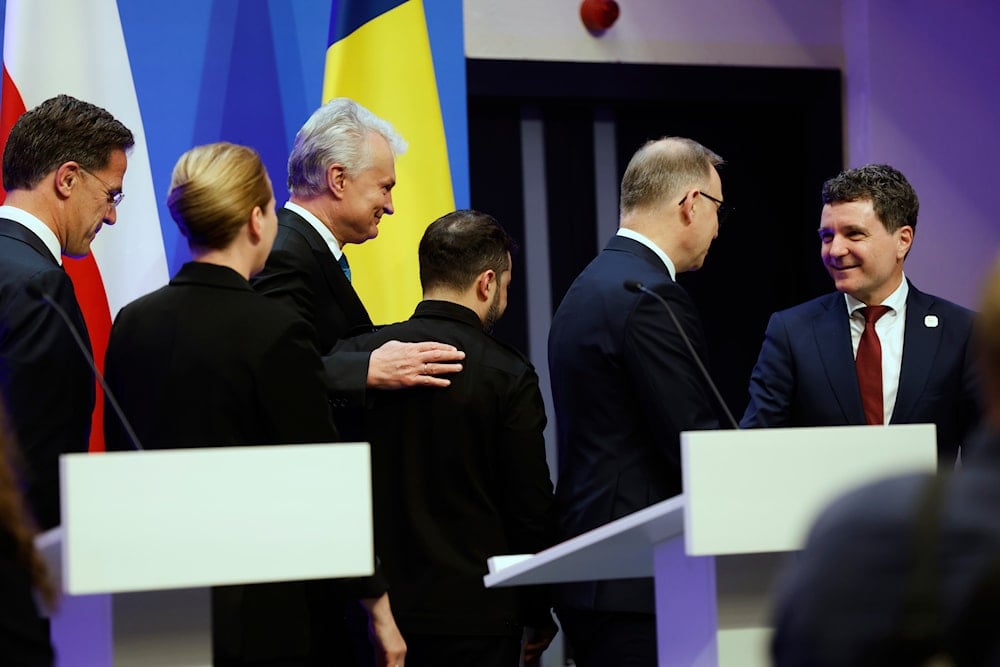NATO pushes for fivefold increase in European air defense forces
NATO urges European members to expand their ground-based air defense forces fivefold, Bloomberg reports, as the alliance aims to address gaps in its military posture.
-

From left, NATO Secretary General Mark Rutte, Denmark's Prime Minister Mette Frederiksen, Lithuania's President Gitanas Nauseda, Ukraine's President Volodymyr Zelensk, Poland's President Andrzej Duda and Romania's President Nicusor Dan leave the stage after addressing a media conference during the Vilnius Summit at the Palace of the Grand Dukes of Lithuania in Vilnius, Lithuania on June 2, 2025. (AP/Mindaugas Kulbis)
NATO is calling on its European member states to increase their ground-based air defense capabilities by fivefold, according to a Bloomberg report published Tuesday, citing sources familiar with the matter. The move is part of a broader NATO air defense expansion strategy aimed at strengthening the alliance’s defensive posture.
The proposed buildup seeks to address what officials have described as a key vulnerability in Europe’s military preparedness amid concerns over alleged "Russian aggression." The plan will reportedly be a central topic of discussion during the upcoming NATO defense ministers' meeting in Brussels on Thursday.
The sources indicated that the air defense gap is considered a high-priority issue within NATO’s strategic framework. That said, enhancing European ground-based air defense systems would serve as a counterbalance to evolving aerial threats, which NATO officials have linked to growing tensions with Russia.
The meeting in Brussels is expected to outline specific contributions from member states toward achieving the proposed scale-up, signaling a continued NATO military buildup in response to what the alliance frames as long-term regional threats.
Alliance seeks to close critical defense gaps
Efforts to expand Europe’s air defense capabilities reflect NATO’s push to modernize and coordinate its collective security mechanisms. The proposal underlines a broader shift toward addressing critical gaps in deterrence strategy, particularly in light of ongoing military developments in Eastern Europe.
The expected deliberations at the Brussels NATO summit underscore the alliance’s intention to reinforce deterrence through a multi-layered approach that integrates both missile defense and ground-based systems.
The NATO air defense expansion initiative represents one of the most ambitious increases in continental defense capacity in recent years, aimed at bolstering preparedness across the alliance.
UK unveils £3 billion defense boost
On a related note, the United Kingdom announced on Monday a sweeping £3 billion military investment aimed at revitalizing its defense industry and preparing the country for potential war with Russia.
Defense Secretary John Healey said the strategy, which includes building six new munitions factories and deploying long-range weapons, is part of Britain’s commitment to modernize its military capacity and deter external threats.
“This is part of our readiness to fight if required,” Healey said during the announcement.
“We are being directly threatened by states with advanced military forces.” British Prime Minister Keir Starmer complimented the urgency in a column for The Sun, stressing that the UK must be ready “to fight and win.”
The defense overhaul is formally detailed in a 130-page strategic review. The government is set to spend £1.5 billion on improving military housing and another £1.5 billion on new “munitions and energetics factories,” which are expected to create 1,800 jobs nationwide.

 3 Min Read
3 Min Read











